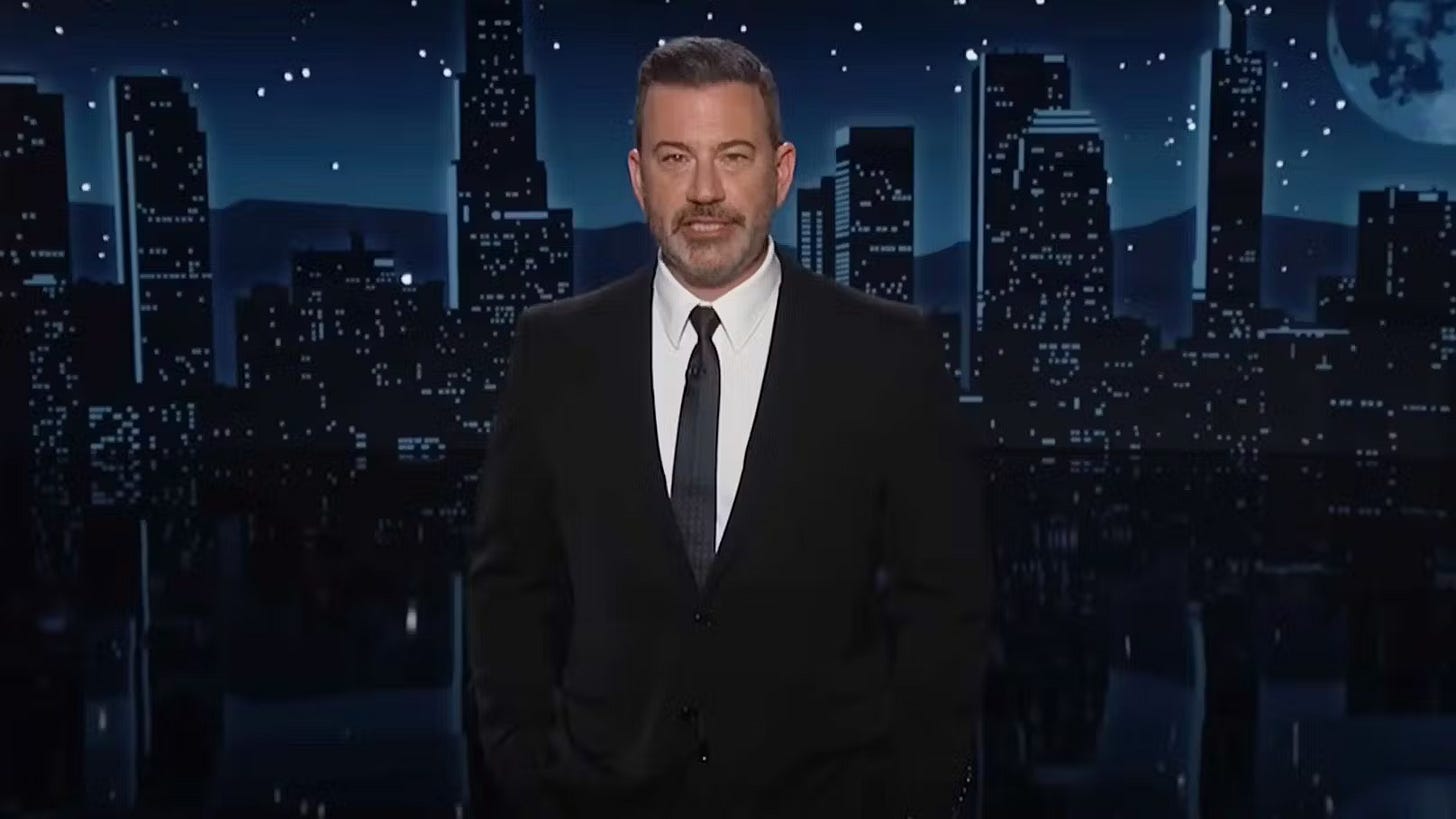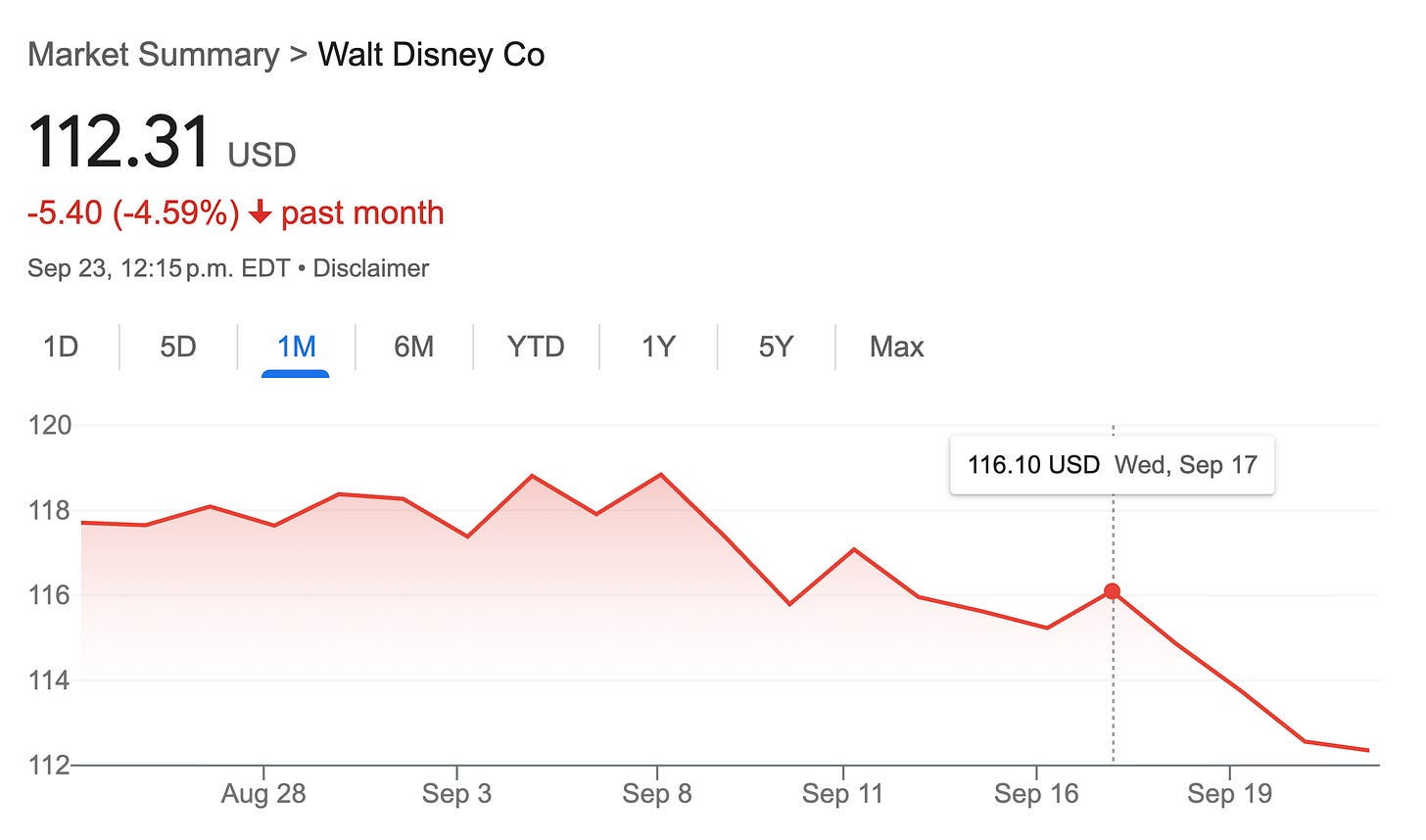Perhaps Democracy Needs Stronger Guardrails Than Corporate Self-Interest
Perhaps it was always inevitable that one of the biggest political flashpoints of the Trump era would involve late night entertainment.
Last week’s abrupt cancellation of Jimmy Kimmel Live! amid pressure from the Trump administration was, on its face, a clear cut (and deeply sinister) use of state power to attack freedom of speech. In this respect, ABC’s rather hasty climbdown and pledge to bring the show back is very obviously good news and suggests institutional pushback against the administration’s increasingly authoritarian direction is indeed possible. In another sense, however, the whole episode merely underscores how tenuous even the most basic democratic values really are when the ultimate determinant — in either direction — amounts to the self-interest of private corporations.
As people were quick to point out, this was very much at the root of ABC’s initial decision to cancel Kimmel’s show. As investigative journalist David Sirota explained on a recent episode of the Lever Time podcast:
Nexstar, which owns local TV stations, is right now begging Trump's FCC Chairman to approve its massive merger with another local TV company. And as The Lever recently reported, Nexstar is also pushing Trump's FCC to relax local media ownership rules…And Disney's [it’s parent company’s] proposed purchase of streaming TV company, FUBU, also needs approval from Trump's justice department. In other words: Trump's administration made clear that it was unhappy with a particular form of media speech, and the corporations needing Trump's regulatory approval then silenced the speech his administration didn't like.
Since the network’s announcement last week, Disney has faced a massive backlash and even a drop in its share price, albeit a relatively small one. It’s also reportedly haemorrhaged subscribers across its various streaming platforms (though I’ve been unable to determine how many). Elsewhere, the Wall Street Journal reports that “concern about entertainment talent’s willingness to work with Disney” caused executives to fear the move might prove detrimental to its movie and TV studios. Either way, market pressures — whether in the direct sense of potential lost revenue from subscription cancellations or generalized public outrage — appear to have spurred the relevant corporate barons to reverse course.
Again, this is obviously the better outcome here. But, in the case of both decisions — ABC’s decision to cancel Kimmel’s show and its subsequent decision to bring it back — the crucial factor was just corporate self-interest. Given their widespread (and, in this case, quite justified) outrage at the Trump administration’s blatant use of state power in the interest of censorship, one might think this fact would inspire at least some reflection on the part of liberal elites.
Between the early 2010s and the end of the Biden administration, elite liberals heavily invested themselves in the idea that the country’s most powerful corporate institutions could be both valued political allies and important stewards of social progress. In 2020, this impulse reached its zenith in the aftermath of George Floyd’s murder, when the behaviour of America’s largest companies momentarily seemed to affirm their unbreakable alliance with the forces of social and cultural liberalism. To mainstream Democrats and MAGA Republicans alike, these events illustrated the triumph of “woke capitalism.” The only thing they disagreed about was whether this was cause for celebration or despair.
Even before the Kimmel debacle, Trump’s second term might have encouraged liberal elites to think twice about their longstanding assumptions. That the likes of Jeff Bezos, Mark Zuckerberg, and Elon Musk — all of whom spent the 2010s as liberally-coded, Democratic-aligned figures — are now firmly in the president’s camp should have been a dead giveaway. In spite of all that, we now hear this from the 2024 Democratic nominee for president about the Kimmel affair:
“Talk about the power being with the people and the people making that clear with their checkbooks as it relates to the suspension of Jimmy Kimmel…We saw the power of the people over the last few days, and it spoke volumes and it moved a decision in the right direction.”
Elsewhere in the same interview, Kamala Harris — in characteristically triangulating fashion — offered qualified criticism of corporate executives only to reaffirm her ultimate conviction they represent a vital bulwark of American democracy:
“I’ve worked closely with the private sector over many years. And I always believed that if push came to shove, those titans of industry would be guardrails for our democracy, for the importance of sustaining democratic institutions. And one by one by one, they have been silent. Perhaps it is because they want to please him and nominate him for a Nobel Prize. Perhaps it’s because they want a merger approved, or they want to avoid an investigation, but at some point they’ve got to stand up for the sake of the people who rely on all of these institutions to have integrity, and to at some point be the guardrails against a tyrant who is using the federal government to execute his whim and fancy because of a fragile ego.”
So there you have it. A vision of democracy under assault by a would-be dictator, backstopped by nothing more than consumer demand and the moral rectitude of industry titans. Not civil society or popular mobilization. Not trade unions, mass protest or even, it seems, the supposed institutions of representative government.
What do you even say at this point? Among the major reasons elite liberals have been so consistently ineffective in opposing Donald Trump is that the conception of democracy they claim to be defending is so laughably anemic. In this particular instance, market pressures happen to have been a corrective in the right’s ongoing crusade against civil liberties and free speech. But corporations and those who lead them have no deep attachment to either of these things, and no investment in social justice beyond what’s afforded by their bottom line.
When democracy is under assault, as it so clearly is in Trump’s America, it needs stronger guardrails and better allies.




The French have a saying; "Money has no smell".
Never before have I understood this so clearly than at this time.
Money will bend the knee to whoever is in power but moreso, they will bend the knee to whoever is more likely to protect them from any kind of interference from society. The fact that Kamala still doesn't see this for what it is, that she still sees the endless potential for donor dinners where the great and the good impart their wisdom, or NGO positions and the various cultural markings which come with them demonstrates why it was so difficult to distinguish her from the corporate politics which Trump pretends (effectively) to eschew.
Never underestimate the ability of a person to fail to understand something when their income depends upon their not understanding it. The problem is that Trump understands it and is unapologetic in exploiting it, and everything else, to his own benefit.